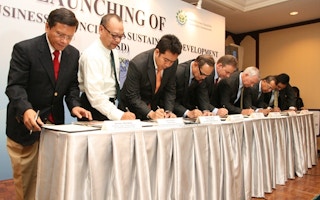Indonesia today became the latest country to join the World Business Council for Sustainable Development (WBCSD), a corporate-led coalition pushing for more environmentally-friendly business practices.
The launch of the Indonesian Business Council for Sustainable Development (IBCSD) is seen as a step toward promoting more sustainable business operations in a country many view as deeply in need of a stronger commitment to environmental preservation. Indonesia is the latest country, after newly inducted Vietnam, to round out the more than 35 countries that already comprise the WBCSD.
The resource-rich country of 240 million is one of the world’s largest suppliers of coal, palm oil and timber. It also has the world’s third-largest tropical forest. But ongoing deforestation and rising carbon emissions plague the country as it struggles to balance environmental preservation with economic growth that topped six per cent last year.
“The need for a careful balance between development and environmental stewardship is increasingly obvious, as is the need to involve the private sector in attaining that balance,” said Suryo Sulisto, chairman of the Indonesian Chamber of Commerce and Industry (KADIN), speaking on the sidelines of the three-day B4E Global Summit that began today in Jakarta.
The six companies inducted into the IBCSD span a range of industries, from cement to energy to banking. Their leaders say conservation need not be seen as an obstacle to development.The companies are: Holcim Indonesia, Garuda, Bakrie Telecom, Medco Power, Asia Pacific Resources International (APRIL) and Bank Negara Indonesia.
Indeed, many of the world’s leading economies are starting to see the benefits of resource efficiency. Neil Franklin, an advisor on Indonesia to the WBCSD, said a “green race” has started among countries and companies to become the leading supplier of low-carbon solutions.
For some companies, such as pulp and paper giant APRIL, operating unsustainably is no longer an option.
“Our business is to plant trees to use for the production of pulp and paper,” said Alain Monie, head of APRIL. “Our areas of operation are areas we need to take care of maintaining.”
To do that APRIL looks at high conservation areas within its concessions and sets aside 20 per cent for preservation. The idea is to balance growth with conservation, allowing the company to expand its plantations in a way that does not disturb fragile ecosystems.
Holcim Indonesia, a subsidiary of the Swiss-based cement company, has committed to reducing its carbon emissions by 25 per cent by using agricultural and plantation waste as fuel for its operations. The company also works with other businesses to provide an outlet for sustainable waste disposal, said company legal advisor Jannus Hutapea.
IBCSD aims to be a resource for businesses to share experiences and opportunities for increasing the sustainability of their operations. It will also play an advisory role to government and non-governmental organisations and reach out to entrepreneurs developing new green technologies, KADIN’s Mr Sulisto said.
“Businesses are developing a deeper understanding of the social and environmental impacts of their operations,” he explained. “And they recognise the need to balance these conflicting considerations in a manner that benefits all Indonesians.”
WBCSD is no small initiative. Its 200 members’ annual revenues total roughly $7 trillion, and it covers a network of more than 60 national and regional business councils.
WBCSD’s Mr Franklin said Indonesia is a very strategic player among that network. Until recently there was an outstanding vacuum when it came to businesses and the public sector taking the lead in environmental protection, he said. Now the political climate is changing.
“The biggest challenge here is shifting from seeing sustainability as a burden to an opportunity,” he said. Corporate social responsibility is a market opportunity and a chance for innovation. Businesses need to see it less as CSR and more as a refined business model, he added.
That’s where the IBCSD comes in - to serve as a platform for communication and advocacy. The launch allowed the six founding members to share their best practices, with the hope of eliminating the perception that sustainability is a drag on revenues.
“There is a clearer recognition that solutions to a low-carbon world lie with businesses being in the driver’s seat,” said Mr Franklin, highlighting a theme set to play out in detail as the B4E summit gets underway this week.
Eco-Business.com’s coverage of the B4E Global Summit 2011 is brought to you by City Developments Ltd (CDL).
Click here to read all stories from the B4E Global Summit 2011.








